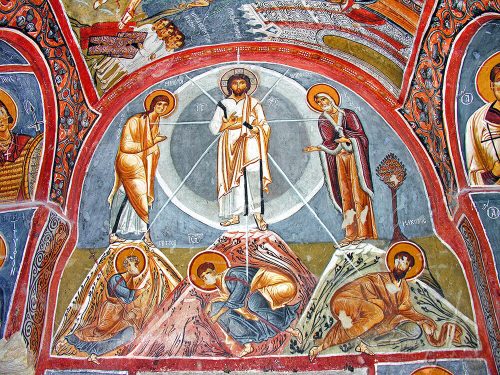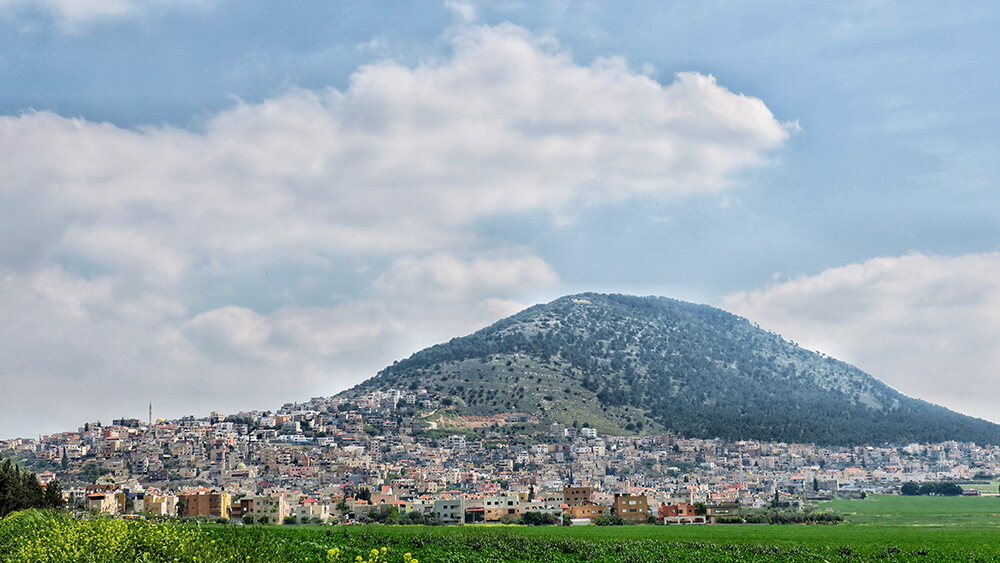
On the luminous feast of the Transfiguration of our Lord, He revealed the glory of God, as uncreated Light, in His human nature, in His body. This Light is the grace of God. Through this light, through grace, God communicates Himself to us. God cannot be understood. Between Him and us, there is a great chasm. He is uncreated, while we are created. In His essence, He cannot be known. That is why the Lord says: “No one knows the Son except the Father. Nor does anyone know the Father except the Son, and the one to whom the Son wills to reveal Him” (Matthew 11:27). So, we know Him tangentially, as it were, but not in His very essence. God communicates Himself to us through His grace, which is uncreated.
The Light on Tabor, the light which emanates from God’s essence, is the expression of His uncreated grace. Our Lord reveals a great mystery today to the foremost among His apostles. And, practically speaking, the present fasting period is not only for the Dormition of the Mother of God, but also for this great feast of our Lord’s Transfiguration.
Today’s feast is a great, luminous, and joyful feast. But amid this joy, we find the Cross. Because on Mount Tabor, where the Lord was with three apostles – Peter, John, and James – there appeared also Moses and Elijah, who were speaking with the Lord about His upcoming Passion (cf. Luke 9:30-31). Therefore, amid the Light, there is a conversation about His Passion, Golgotha, the Cross. Today there is great grace and light, but these foreshadow an even greater grace, which is on Golgotha. On Golgotha, God gave greater revelations than on Tabor. There, on Golgotha, we have the perfect revelation of God’s love. God cannot reveal Himself more fully or completely in His love than on Golgotha. The Transfiguration points to Golgotha, and it happened 40 days before the Crucifixion. In the Church calendar, the Holy Fathers placed today’s feast 40 days before the feast of the Exaltation of the Cross. That’s why this Dormition Fast resembles Great Lent in terms of strictness, because both feasts – Pascha and Transfiguration – have the Cross at the center.
The Transfiguration takes place in a context. Our Lord has turned His face toward Jerusalem and He asks His disciples: “Who do men say that I am?”, and they respond: “Some say Moses, others Elijah, Jeremiah, or one of the prophets.” Then, He asks them: “But who do you say that I am?” And Peter replies: “You are the Christ, the Son of the living God.” At this, the Lord responds: “Blessed are you, Peter, for flesh and blood has not revealed this to you, but My Father who is in heaven” (cf. Matthew 16:13-20). Only after this dialogue does the Lord begin speaking about His Passion. Saint Sophrony of Essex emphasizes the fact – and you have to be a saint to observe this – that in the moment of the disciples’ maximum recognition of the Lord, when they openly declared Him to be the long-awaited Messiah sent by God, at that moment He starts talking about His Passion. Until then, He did not mention the Cross. Only from then on does He start talking about it. Through everything He does and is, our Lord teaches us humility. Therefore, in any moment of maximum recognition, appreciation, or success, we need to preserve humility, to recall the Cross which awaits us. This is the essence of the word, “Keep thy mind in hell and despair not,” which the Lord spoke to Saint Silouan the Athonite.

Let us consider today’s feast again, the Transfiguration. It is God’s maximum revelation in light, on earth: Christ transfigured. Yet He concentrates upon the Cross. It is not an act of self-satisfaction or earthly self-fulfillment, but rather He remains humble, looking to the Cross. Everything the Lord does teaches us humility. We need to do likewise, not to be oblivious. As Saint Silouan prayed: “Lord, even if You take me to heaven, I will tell You: ‘Let me weep for my sins.’” This is the voice of an experienced man, who knows how easily man can fall. That’s why Saint Silouan told Saint Sophrony that in all things, our Lord teaches us humility. No matter how praiseworthy or wonderful I might be, I need to expect the cross that is right around the corner, which will surely overwhelm me. That’s not to say that it overwhelmed the Lord, but clearly it wasn’t pleasant, it cost Him everything. Well, likewise with us. Therefore, the person with experience, who is spiritually mature, is not impressed when he is doing well. For someone without experience, however, when he’s up, no one can reach up to touch him, but when he’s down, nothing can lift him up from depression. That’s how the unexperienced person is.
The Lord is complete, fully man. Through all things, the Lord teaches us humility. When we are praised, not the praise is important, but the fact that God works in us. We are the same sinful person, as the psalm says, “my sin is ever before me” (Psalm 50:4). I should know that I’m capable of any evil in this world, as Father Rafail Noica says, but whatever is good is God’s work.
This is a takeaway from today’s feast: to remain humble. This is natural for the Lord, but we need to acquire humility, to learn it from Him.
